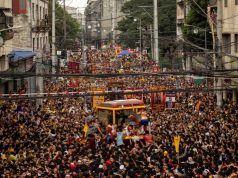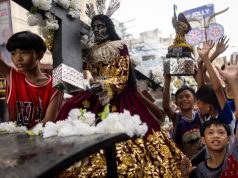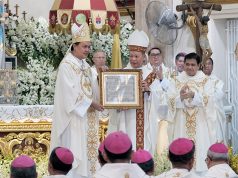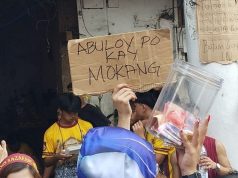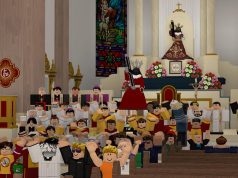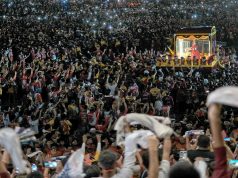MANILA, Philippines — This year’s Traslacion, or procession of the Black Nazarene, scheduled January 9, Tuesday, will have a new feature — 12 prayer stations strung out along the route from the Quirino Grandstand to Quiapo Church.
At each station, communal prayers will be said as the Andas, the carriage bearing the image of Christ bearing the Cross, approaches; blessings with incense and holy water will be dispensed as it passes by; and singing as itt departs.
The prayer stations will be located at:
- Manila Hotel
- National Museum
- Pedestrian underpass in P. Burgos cor. Victoria (in front of Manila City Hall)
- Pedestrian underpass in Liwasang Bonifacio
- Escolta Arc
- Sta. Cruz Church
- Arlegui cor. Quezon Boulevard
- Pedestrian overpass in Arlegui cor. P. Casal
- Canopy of Manuel L. Quezon University
- San Sebastian Church
- Barangay hall in Guzman St.
- Globo de Oro
A medical team, a rescue team, police officers, the Bureau of Fire Protection, city government representatives, and a priest, among others, will also be assigned to each prayer station.
At a press conference at the Pope Benedict XVI Building next to Quiapo Church on Wednesday, the Manila Police District Traffic Enforcement Unit also laid out the route of the procession, which has some “adjustments,” as parochial vicar Fr. Douglas Badong called them, at the start.
From Quirino Grandstand (Independence Road), the procession will turn right to Katigbak Drive then straight to P. Burgos (westbound lane) going to P. Burgos (southbound lane) through Jones Bridge.
It will then turn right to Dasmariñas, turn right again towards Plaza Santa Cruz, turn left to Palanca St., turn left to Quezon Blvd, turn right to Arlegui St., turn right to Fraternal St., turn right to Vergara St., turn left to Duque de Alba, turn left to Castillejos St., turn left to Farnecio St., turn right to Arlegui St., turn left to Nepomuceno St. (counter-flow), turn left to Aguila St., turn right to Carcer St., turn right to Hidalgo through Plaza del Carmen, turn left to Bilibid Viejo St. through Puyat, turn left to Guzman St., turn right to Hidalgo St., turn left to Bautista St. (Barbosa), turn right to Globo de Oro through under Quezon Bridge, turn right to Palanca St., then turn right to Villalobos St. through Plaza Miranda going to Quiapo Church.

“We are ready for the Traslacion,” Superintendent Lucile Faycho of the MPD said. She added they have not monitored any threats to the procession so far but are taking measures to prevent untoward incidents.
Organizers announced that stoves will not be allowed in Rizal Park to prevent accidents, and black plastic trash bags will also be banned. As an alternative, devotees may use transparent plastic bags instead, so authorities can see their contents.
Replicas will no longer be allowed at the Quirino Grandstand, and will only be limited to the area from the National Museum to City Hall.
Tents will also be confined to the back of the Rizal Monument, behind the carabao statue. The estandarte (banners) will be limited to Roxas Blvd. and the area with the Bermuda grass.
Portalets will be stationed along Roxas Blvd. and Kalaw Ext.
Katigbak Driveway will be off-limits to all vehicles; access will be for authorized personnel only.
Kalaw Ext. will be accessible for the Pahalik (kissing of the image), and to guests of H2O and Luneta Park Hotels, and authorized vehicles only.
The parade grounds (Independence Road) will be a restricted area until the start of the procession, with only the PNP and Armed Forces of the Philippines allowed access.

Quiapo Church rector and parish priest Msgr. Hernando Coronel again reminded those with health conditions to stay home instead of joining the procession and promised to say prayers for them. Parents are also discouraged from bringing their children, because they might get lost.
Children and teenagers are also instructed to avoid climbing on the Andas, especially since a number of girls were recorded as suffering difficulty breathing during the thanksgiving procession held by Quiapo Church on December 31.
Drone cameras are not allowed, except for those designated by Quiapo Church officials to take shots. There will also be “segmentized” mobile phone signal interruption, based on where the carriage is.
Coronel also asked devotees to report anything suspicious to the police.
Last year’s traslacion was among the longest, lasting 21 hours. This year, said Badong, they hope it will be completed within 12 hours.
But whether this goal is accomplished, he said, what is important is for the procession to be safe and orderly.





